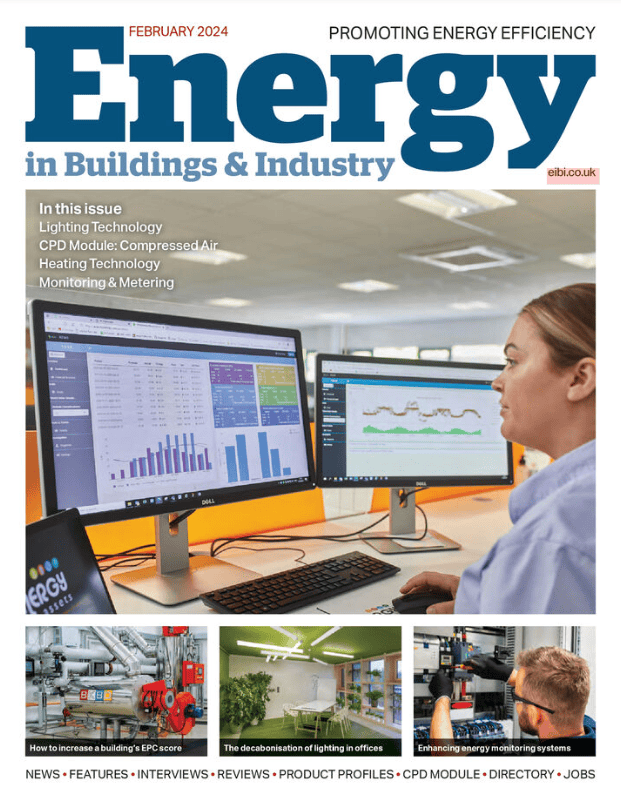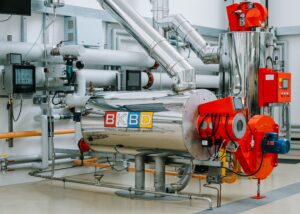Expert View: Condensing Boilers Can Boost your Building’s EPC Rating

BKBD’s Managing Director, Nick Guy, explains in his article published in February’s edition of Energy in Buildings & Industry, why some fully condensing boilers can increase a building’s EPC score compared to heat pumps, granting building owners potentially better access government funds.
Since 2018 and with some exceptions, all commercial buildings require a non-domestic Energy Performance Certificate (EPC) rating of E or above when sold or newly let, this includes existing tenancies since April last year. As part of the government’s plan to reach its Net Zero target, it is planned that the minimum energy efficiency standards (MEES) will be increased again in 2027 to a minimum of EPC C, and to B in another 3 years. In reality, looking at London, more than 50% of office space in the City of London currently has an EPC rating of less than B (Department for Levelling Up, Housing and Communities).
Settling a score
To determine a building’s EPC rating, several factors are evaluated – including the age, construction, and size of the property, insulation, lighting, windows, primary heating systems, and secondary heat sources (including renewable energy sources). The evaluation also takes the energy ratings (ErP) of individual appliances into account, with ‘A-rated’ products increasing a building’s EPC score, whereas a lower ErP decreases the score.
The biggest energy consumer, and thereby biggest contributor to the EPC rating, is the heating system. Most systems use traditional boilers which often run as low as 65% efficiency – that’s 65% of fuel costs being used for heating, 35% is lost in emissions. When those systems are upgraded, the likely choice is between heat pumps, a more efficient boiler system, or a combination of both.
Looking at heat pumps, we differentiate between air source and ground or water source products. Both options use electricity to extract ambient warmth, before concentrating the heat and pushing it indoors. Heat pumps run at a flow temperature between 35 and 55 degrees. On average and when purely viewing the heat output level, they are 300% more efficient than other heating systems, because the amount of heat they produce is more than the amount of electricity they use. Having said that, heat pumps are most efficient when the intake source is a similar temperature to the flow temperature, as less electricity is required to generate the balance. With temperatures hitting below freezing, more electricity is required to warm up the intake source for indoor heating and hot water.
Comparing benefits
From a sustainability perspective, they are a low-carbon heat alternative with an average reduction in carbon emissions of around 65% compared to a natural gas alternative, given their high efficiency per KW of electricity used. However, A-rated, fully condensing boilers release only water into the atmosphere and would be carbon neutral when run with green hydrogen.
Another point where heat pumps are often referred to as more sustainable, is that they are regarded as a renewable energy option – given that the primary source is ambient heat in the air or ground. Nonetheless, the electricity they require to run is often generated by fossil fuels. Unless renewable electricity is used to power the heat pump (e.g. solar, wind), they aren’t a fully sustainable solution. Another factor to consider when comparing the two systems, are the high upfront costs of heat pumps when retrofitted in existing buildings. Heat pumps often require a full upgrade of a building’s heating system, excellent insulation, along with outside space, which frequently makes them unsuitable for retrofits in areas with a dense infrastructure.
Looking at fully condensing boilers, these types of boilers have long been established in the domestic market. They are now increasingly available for commercial and small industrial settings. Compared to standard boilers, fully condensing boilers are designed differently which enables them to operate at 107% efficiency. Although heat pumps average 300% efficiency, fuel costs between the two systems are comparable or lower for fully condensing boilers, due to the cost of electricity versus natural gas. Another advantage of high efficiency boiler systems is that some are manufactured to fit into every existing heating system. For example, BKBD’s patented design makes the boiler 100% condensing at 80°C with an 80/60 flow and return and 11°C differential in all systems – making it a much simpler and considerably cheaper installation with minimal alterations to the existing system. In addition, switching to hydrogen can be done by changing one component in the burner.
Deep impact
So, how do the two heating systems impact your EPC rating? The assessment of the EPC score is largely based on the cost of heating and powering the building rather than the carbon emissions generated. This means the more expensive the fuel, the lower the rating. When comparing the costs of both systems, given that electricity is roughly four times the price of gas, the actual running costs of an air source heat pump versus a high efficiency gas-powered boiler are comparable. This means that a heat pump can, in reality, downgrade a building’s EPC rating, while a fully condensing, A+ rated boiler would increase it. Groups have been lobbying to have the EPC assessment form reviewed to include carbon emissions efficiency. Given that heat pumps produce less CO2 than burning gas, this change would let heat pumps increase your EPC rating. However, a fully condensing boiler is carbon neutral when fired with green hydrogen or other Renewable Natural Gas options. The ability to fire multi fuel and to change fuel ‘on the fly’ are built into the design of some fully condensing boiler packages like the BKBD.
Additional funds
The bigger picture right now is that increased EPC ratings might grant access to additional government funds. The Public Sector Decarbonisation Scheme provides grants for public sector bodies to fund heat decarbonisation and energy efficiency measures. Phase 3 of the scheme will provide over £1.425 billion of grant funding over the financial years 2022 to 2023 and 2025 to 2026.
The decision for a heating system is always driven by a wide variety of factors: site needs, budget and ROI, health, safety, and environmental requirements. Together, they make up the business case to determine the best possible solution for each building or building complex. There is no ‘one size fits all solution’, and it takes careful consideration to evaluate which system (or combination of systems) is the most appropriate for a building.
Contact us
For more questions or project specific quotes, contact Nick at sales@bkbdboilers.co.uk.

Read more:
Find out more about Energy in Buildings & Industry.
